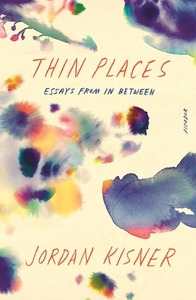Take a photo of a barcode or cover
informative
reflective
challenging
emotional
hopeful
inspiring
reflective
medium-paced
challenging
informative
reflective
sad
Very thought provoking and relevant. Kisner’s essays make me want to write and reflect on myself and my life the way she does. A great read.
emotional
informative
reflective
slow-paced
emotional
funny
inspiring
reflective
A collection of essays exploring many facets of liminality, from the titular concept of thin places to the Tex-Mexican borderlands, the transition from life to death and body to corpse pansexuality, religious ambiguity, and biracial identity. Perhaps fittingly, these also straddle the line between memoir and journalistic writing, with Kisner interweaving (or, more often, juxtaposing) reflections from her personal life alongside the subjects and concepts she is examining. Unfortunately, I often found that element to read clunkier and less cohesive than ideal, leaving me with a sense of disparate threads that were not knotted together in a particularly satisfying or savvy way. And yet, when each distinct style of writing is considered on its own, there's a lot to appreciate.
I especially enjoyed the more distanced, journalistic considerations of hip Hillsong pastors leading a beachside "pop-up" church for the summer in "Jesus Raves," Mormon mothers who began organizing around social justice concerns in response to Trump's presidency in "Stitching," and the patriotic debutante society in the borderland town of Laredo, Texas in "Habitus." The latter in particular highlights both Kisner's adept skill and my frustration with her proclivities towards "more is more." She even includes a meta-comment about how difficult this essay was to write, followed by the epiphany that it needed a more intimate consideration of her own lineage and mother-daughter relationship streaming through it. But in my reading, those details seemed to mostly muddy the otherwise carefully crafted and communicated insights Kisner offers on the peculiarities of the society and the town it has emerged from. In other essays, however, like the opening "Attunement" or the finisher "Backward Miracles," it's undeniably the more personal, memorist-style writing that shines, as Kisner discusses her tenuous relationship with Christianity, her chase after the "flares" of happiness, and the loving relationship she's settled into with herself and her partner –– and they feel a bit bogged down by the historical info that feels tangential but is given a persisting spotlight treatment.
While I have my critiques from a more editorial end, I found a lot to appreciate here. In fact, I'd describe "The Other City," as a perfect essay. It relays Kisner's stint shadowing the employees of a medical examiners office in Cleveland, Ohio, detailing observations from autopsies, staff meetings, and conversations with the people whose day job involves the gory, gruesome onslaught of death. Although abundantly rich with insights from a diverse number of perspectives, they all still felt immediately traceable to the essay's core, resulting in a brilliantly focused piece that stood out among the others. As someone pursuing a vocation in chaplaincy, I also felt a lot of resonance with the frank discussions of death and the unique gifts and challenges of careers that force us to recognize it's constant (and constantly denied) presence. There is also some gorgeous writing throughout the essay that I really appreciated and see myself returning to. I also adored "Soon This Space Will Be Too Small," one of the shortest essays in the book and yet one of the most moving –– I actually think it would have made a perfect conclusion. It offers a gorgeous articulation of the themes that unite these stories of liminality, thresholds, and thin places. I'll close with a quote from it that I was especially fond of:
"Nearby, there is some other way of being we can not yet imagine. And that other world is near, is with us, our whole lives long, sometimes faintly audible, as if something is happening just on the other side of a very, very thin wall. We can forget about it for a long time, and then it comes again."
I especially enjoyed the more distanced, journalistic considerations of hip Hillsong pastors leading a beachside "pop-up" church for the summer in "Jesus Raves," Mormon mothers who began organizing around social justice concerns in response to Trump's presidency in "Stitching," and the patriotic debutante society in the borderland town of Laredo, Texas in "Habitus." The latter in particular highlights both Kisner's adept skill and my frustration with her proclivities towards "more is more." She even includes a meta-comment about how difficult this essay was to write, followed by the epiphany that it needed a more intimate consideration of her own lineage and mother-daughter relationship streaming through it. But in my reading, those details seemed to mostly muddy the otherwise carefully crafted and communicated insights Kisner offers on the peculiarities of the society and the town it has emerged from. In other essays, however, like the opening "Attunement" or the finisher "Backward Miracles," it's undeniably the more personal, memorist-style writing that shines, as Kisner discusses her tenuous relationship with Christianity, her chase after the "flares" of happiness, and the loving relationship she's settled into with herself and her partner –– and they feel a bit bogged down by the historical info that feels tangential but is given a persisting spotlight treatment.
While I have my critiques from a more editorial end, I found a lot to appreciate here. In fact, I'd describe "The Other City," as a perfect essay. It relays Kisner's stint shadowing the employees of a medical examiners office in Cleveland, Ohio, detailing observations from autopsies, staff meetings, and conversations with the people whose day job involves the gory, gruesome onslaught of death. Although abundantly rich with insights from a diverse number of perspectives, they all still felt immediately traceable to the essay's core, resulting in a brilliantly focused piece that stood out among the others. As someone pursuing a vocation in chaplaincy, I also felt a lot of resonance with the frank discussions of death and the unique gifts and challenges of careers that force us to recognize it's constant (and constantly denied) presence. There is also some gorgeous writing throughout the essay that I really appreciated and see myself returning to. I also adored "Soon This Space Will Be Too Small," one of the shortest essays in the book and yet one of the most moving –– I actually think it would have made a perfect conclusion. It offers a gorgeous articulation of the themes that unite these stories of liminality, thresholds, and thin places. I'll close with a quote from it that I was especially fond of:
"Nearby, there is some other way of being we can not yet imagine. And that other world is near, is with us, our whole lives long, sometimes faintly audible, as if something is happening just on the other side of a very, very thin wall. We can forget about it for a long time, and then it comes again."
Hmm. 3.5. While the side stories in the essays are interesting, I don’t feel they always added to the theme. Nonetheless, this collection had me reflecting on the ways I view and interact with the world around me.
reflective
medium-paced




